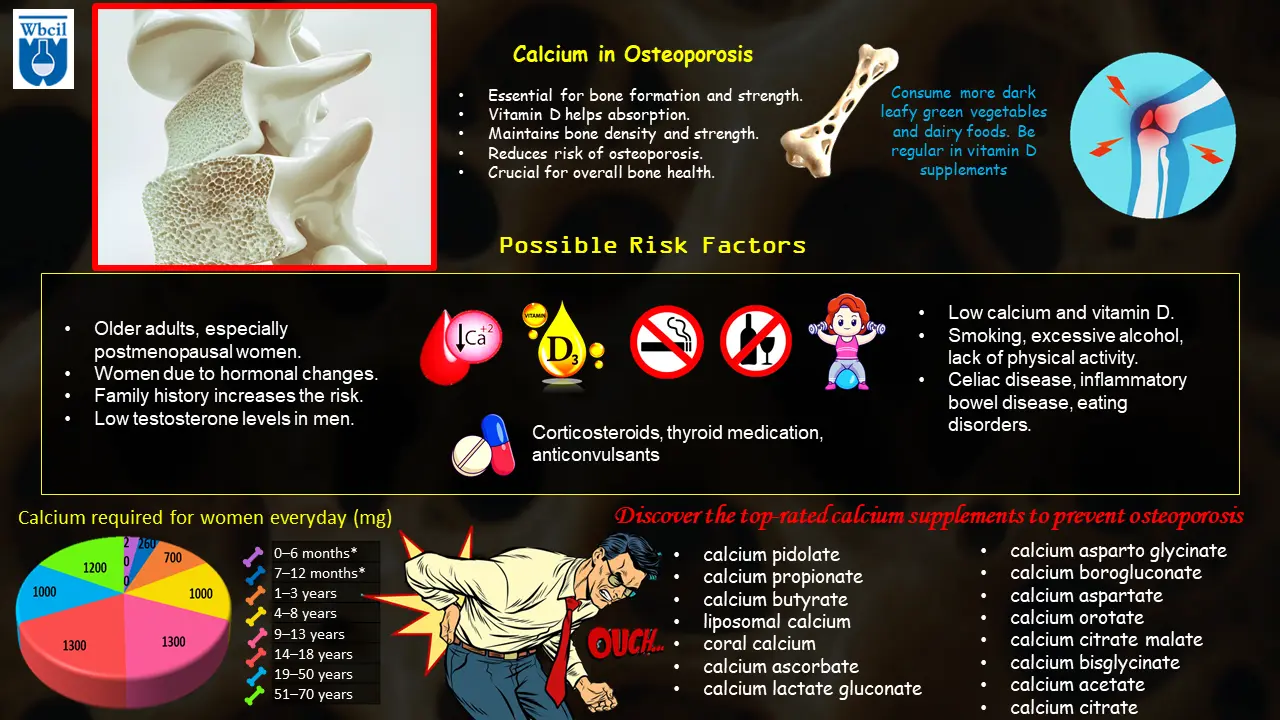Calcium Salts- A Fortress Against Osteoporosis
Osteoporosis, a silent disease characterized by weakened bones, is a significant public health concern. One of the key strategies to combat this condition is to increase calcium intake. Calcium, a vital mineral, plays a crucial role in bone formation and maintenance [1]. However, not all calcium supplements are created equal. This blog post will delve into the different types of calcium salts used to treat osteoporosis, their side effects, and other factors to consider.
What are the causes of Osteoporosis?
Symptoms of a vertebral fracture can include severe back pain, loss of height, and spinal deformities like kyphosis, which is characterized by a hunched or stooped posture. Osteoporosis can be caused by a combination of factors, including age, genetics, hormonal changes, and certain lifestyle choices [2,3,4]. Understanding the underlying causes is essential for prevention and effective management in osteoporosis treatment.
- Age-Related bone loss: Bone density naturally decreases with age, especially after menopause in women and andropause in men [5].
- Hormonal Changes: Women are more susceptible to postmenopausal osteoporosis than men due to hormonal changes that occur during menopause, which significantly impact bone density [6]. Osteoporosis is not just a women’s health issue; men can also develop this bone-weakening condition [7].
- Medications: Certain medications, such as corticosteroidBone Healths and proton pump inhibitors, can increase the risk of osteoporosis [8].
- Lifestyle Factors: Smoking, excessive alcohol consumption can contribute to osteoporosis [9]. Preventing osteoporosis requires a proactive approach that includes a balanced diet and nutrition rich in calcium and vitamin D synergy, regular weight-bearing exercise, and maintaining a healthy lifestyle [10,11].
- Genetic Predisposition: Family history of osteoporosis can increase your risk.

The Role of Calcium salts in Bone Health
Calcium is the most abundant mineral in the human body, and 99% of it is found in bones and teeth. It is essential for bone formation, strength, and maintenance. When calcium intake is insufficient, the body may draw calcium from bones, leading to bone loss and increased risk of osteoporosis.
- Role of Calcium in Bone Density: Calcium is a key component of bone tissue. By consuming adequate calcium, you can help prevent bone loss and maintain bone health and density [12].
- Fracture Prevention: Osteoporosis increases the risk of fractures. Regular calcium supplementation can significantly reduce this risk, especially in individuals at high risk.
- Improved Bone Health: Calcium plays a crucial role in bone metabolism, aiding in the formation of new bone tissue and the repair of damaged bone [13].
Calcium salts (calcium supplements) for Osteoporosis
- Calcium Carbonate: Calcium carbonate is a common and effective calcium supplement for individuals seeking to maintain bone health and prevent osteoporosis [14,15].
- Calcium Citrate: Calcium citrate, a highly absorbable form of calcium, is often recommended to support bone health and prevent osteoporosis. Its citrate form enhances absorption, making it a convenient and effective option for individuals seeking to maintain bone density. [16,17].
- Calcium Gluconate: This calcium salt is less commonly used than calcium carbonate or calcium citrate. It is generally well-tolerated but may cause diarrhea in some people [18].
- Calcium Lactate: This form of calcium is often used in combination with other minerals, such as magnesium and zinc [19]. Calcium lactate is a supplement used to treat osteoporosis, parathyroid disorders, and some muscle conditions [20].

Diagnosis and Treatment
- A bone mineral density test measures the mineral content of your bones to determine if you have osteoporosis, a condition characterized by weak and fragile bones that are more susceptible to fractures [21]. The test uses X-rays to assess the density of a specific bone segment, measuring the amount of calcium and other minerals present.
- Osteoporosis medications can help slow bone loss, increase bone density, and reduce the risk of fractures. A healthcare professional can determine the most appropriate medication based on individual needs and medical history [22].
- Bisphosphonates are medications that help prevent bone loss by slowing down the rate at which bones break down [23]. These drugs can reduce the risk of fractures in the hip and spine.
- Hormone replacement therapy (HRT) can be a valuable option for postmenopausal women with osteoporosis, as it helps mitigate the effects of declining estrogen levels on bone health [24].
- Regular physical activity, specifically weight-bearing exercises, can significantly improve bone strength and reduce the risk of osteoporosis [25].
- In severe cases of osteoporosis, surgery may be necessary to treat fractures or correct spinal deformities [26].
Factors to Consider When Choosing a Calcium Supplement for osteoporosis
By focusing on whole foods from dietary sources and limiting processed options, individuals can support bone health and reduce the risk of fractures. Boost your bone health and prevent osteoporosis with a diet rich in calcium. Discover the top-rated calcium supplements to support bone health and prevent osteoporosis. Find expert recommendations for the best calcium options on the market.
- Absorption Issues: The type of calcium salt you choose can affect how well your body absorbs calcium, i.e., the absorption rates [27]. Calcium carbonate is best absorbed when taken with food, while calcium citrate can be absorbed on an empty stomach.
- Side Effects: Some people may experience side effects, such as gastrointestinal issues, constipation, bloating, or gas, when taking calcium supplements. Calcium overdose, also known as hypercalcemia, can lead to serious health problems, including kidney stones. If you experience these symptoms, you may need to try a different type of calcium salt or reduce your dosage [28]. While calcium is essential for bone health, excessive intake can lead to calcium overdose.
- Dosage recommendations: The recommended daily intake of calcium varies depending on your age and gender. It is important to follow the dosage instructions on your calcium supplement [19,30]. The recommended daily intake of calcium is 1,000 mg for adults aged 19-50 and men aged 51-70, while women aged 51-70 and adults 71 and older should consume 1,200 mg [31].
- Other Nutrients: Calcium is not the only nutrient important for bone health. Vitamin D is also essential for calcium absorption [32,33].
Calcium supplements offered by WBCIL
- calcium pidolate
- calcium propionate
- calcium butyrate
- liposomal calcium
- coral calcium
- calcium ascorbate
- calcium lactate gluconate
- calcium asparto glycinate
- calcium borogluconate
- calcium aspartate
- calcium orotate
- calcium citrate malate
- calcium bisglycinate
- calcium acetate
- calcium citrate
Conclusion
Calcium Rich Foods to Prevent Osteoporosis is a crucial aspect of bone health management. How Much Calcium for Osteoporosis Management varies based on individual needs, but it’s important to consult with a healthcare professional for personalized guidance. Comparing Calcium Supplements for Seniors can help you find the most suitable option. Calcium Rich Foods to Prevent Osteoporosis include dairy products, leafy green vegetables, fortified cereals, and legumes. The Role of Calcium in Bone Density is significant, as calcium is a primary building block of bones. Benefits of Calcium Salts for Osteoporosis include increased bone density and reduced risk of fractures.
Osteoporosis Prevention with Calcium is a proactive approach to maintaining bone health. Best Calcium Salts for Bone Health can vary depending on individual factors. Calcium Supplements for Osteoporosis can be a valuable addition to a healthy diet for those who may not meet their daily calcium requirements.
1.https://www.emedicinehealth.com/osteoporosis_and_calcium/article_em.htm
2.https://www.medicalnewstoday.com/articles/how-much-calcium-for-osteoporosis#calcium-requirements-for-osteoporosis
3.https://www.rxlist.com/calcium_salts/drug-class.htm
4.https://www.verywellhealth.com/what-type-of-calcium-supplement-is-best-2549695
5.https://www.health.harvard.edu/blog/how-well-does-calcium-intake-really-protect-your-bones-201509308384
6.Wark JD, Nowson C. Calcium supplementation: the bare bones. Aust Prescr 2003;26:126-7.https://doi.org/10.18773/austprescr.2003.094. https://australianprescriber.tg.org.au/articles/calcium-supplementation-the-bare-bones.html
7.https://courses.washington.edu/bonephys/opcalcium.html
8.https://www.mskcc.org/pdf/cancer-care/patient-education/calcium-supplements?mode=large
9.https://melioguide.com/osteoporosis-nutrition/calcium-supplements-for-osteoporosis/
10.https://www.medicalnewstoday.com/articles/calcium-for-osteoporosis
11.https://www.worldactiononsalt.com/salthealth/factsheets/osteoporosis/
12.Dawson-Hughes, Bess; Dallal, Gerald E.; Krall, Elizabeth A.; Sadowski, Laura; Sahyoun, Nadine; Tannenbaum, Saul . (1990). A Controlled Trial of the Effect of Calcium Supplementation on Bone Density in Postmenopausal Women. New England Journal of Medicine, 323(13), 878–883. doi:10.1056/NEJM199009273231305. https://www.nejm.org/doi/full/10.1056/NEJM199009273231305
13.https://www.health.ny.gov/publications/1980/index.htm
14.https://healthybonesaustralia.org.au/your-bone-health/calcium/
15.https://www.health.harvard.edu/nutrition/choosing-a-calcium-supplement
16.https://www.hss.edu/conditions_calcium-supplements-vitamind-osteoporosis.asp
17.https://orthoinfo.aaos.org/en/staying-healthy/calcium-nutrition-and-bone-health/
18.Liu, T., Yu, H., Wang, S. et al. Chondroitin sulfate alleviates osteoporosis caused by calcium deficiency by regulating lipid metabolism. Nutr Metab (Lond) 20, 6 (2023). https://doi.org/10.1186/s12986-023-00726-3
19.https://www.healthline.com/nutrition/calcium-supplements
20.https://my.clevelandclinic.org/health/articles/15049-osteoporosis-prevention-with-calcium-treatment
21.Sunyecz JA. The use of calcium and vitamin D in the management of osteoporosis. Ther Clin Risk Manag. 2008 Aug;4(4):827-36. doi: 10.2147/tcrm.s3552. PMID: 19209265; PMCID: PMC2621390. https://www.ncbi.nlm.nih.gov/pmc/articles/PMC2621390/
22.https://www.mayoclinic.org/healthy-lifestyle/nutrition-and-healthy-eating/in-depth/calcium-supplements/art-20047097
23.Fritz K, Taylor K, Parmar M. Calcium Carbonate. [Updated 2023 Aug 5]. In: StatPearls [Internet]. Treasure Island (FL): StatPearls Publishing; 2024 Jan-. Available from: https://www.ncbi.nlm.nih.gov/books/NBK562303/
24.https://health.umms.org/2022/07/26/calcium-supplements-for-osteoporosis/
25.Heaney RP, Recker RR, Watson P, Lappe JM. Phosphate and carbonate salts of calcium support robust bone building in osteoporosis. Am J Clin Nutr. 2010 Jul;92(1):101-5. doi: 10.3945/ajcn.2009.29085. Epub 2010 May 19. PMID: 20484446; PMCID: PMC2884321. https://pubmed.ncbi.nlm.nih.gov/20484446/
26.https://www.osteoporosis.foundation/educational-hub/topic/calcium/calcium-recommendations
27.https://www.webmd.com/vitamins/ai/ingredientmono-781/calcium
28.https://www.bonehealthandosteoporosis.org/patients/treatment/calciumvitamin-d/
29.https://www.aafp.org/pubs/afp/issues/2000/1015/p1895.html
30.Beverley Shea, George Wells, Ann Cranney, Nicole Zytaruk, Vivian Robinson, Lauren Griffith, Zulma Ortiz, Joan Peterson, Jonathan Adachi, Peter Tugwell, Gordon Guyatt, VII. Meta-Analysis of Calcium Supplementation for the Prevention of Postmenopausal Osteoporosis, Endocrine Reviews, Volume 23, Issue 4, 1 August 2002, Pages 552–559, https://doi.org/10.1210/er.2001-7002
31.Khandmaa Dashnyam, Oyunchimeg Bayaraa, Nandin Mandakhbayar, Jeong-Hui Park, Jung-Hwan Lee, Tae-Su Jang, Khurelbaatar Luvsan, and Hae-Won Kim, ACS Biomaterials Science & Engineering 2020 6 (8), 4604-4613. DOI: 10.1021/acsbiomaterials.0c00219.https://pubs.acs.org/doi/abs/10.1021/acsbiomaterials.0c00219
32.https://www.medicinenet.com/calcium_salts/article.htm#what_are_calcium_salts_used_for
33.https://www.webmd.com/osteoporosis/calcium-supplements-tips
Calcium citrate is often considered the best for osteoporosis because it is well absorbed, even on an empty stomach. Calcium carbonate is also effective but should be taken with food for better absorption.
Calcium salts, primarily calcium phosphate in the form of hydroxyapatite, provide rigidity and strength to bones. They make up the mineral portion of the bone matrix, contributing to bone density.
High sodium intake can increase calcium loss through urine, which may negatively impact bone density and increase the risk of osteoporosis. It’s recommended to limit excessive salt consumption to support bone health.
Calcium citrate powder is considered one of the best options for bone health due to its higher absorption rate, especially for those with lower stomach acid. Calcium carbonate powder is another common option, but it requires food for proper absorption.
The best sources of calcium for bone strength include:
Dairy products (milk, yogurt, cheese)
Leafy green vegetables (kale, broccoli)
Fortified foods (cereals, orange juice)
Fish with soft bones (sardines, salmon)
Calcium-fortified plant-based milk (almond, soy milk)
Excessive calcium intake can lead to:
Kidney stones
Constipation
Calcium buildup in blood vessels (calcification)
Hypercalcemia, which may cause nausea, vomiting, fatigue, and confusion Increased risk of cardiovascular problems in some cases with long-term high calcium supplementation.
